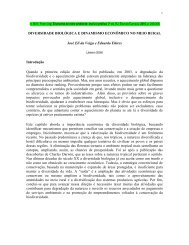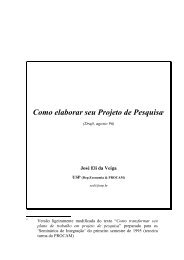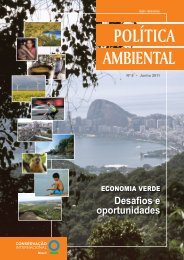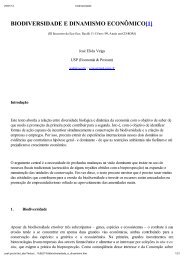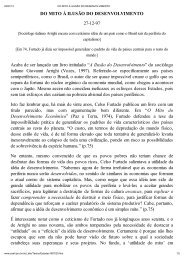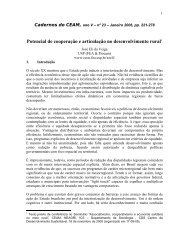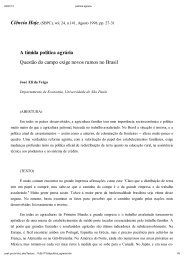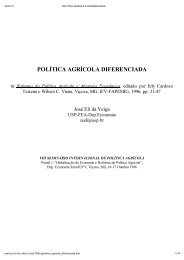sustainable development 20 years on from the ... - José Eli da Veiga
sustainable development 20 years on from the ... - José Eli da Veiga
sustainable development 20 years on from the ... - José Eli da Veiga
Create successful ePaper yourself
Turn your PDF publications into a flip-book with our unique Google optimized e-Paper software.
236<br />
The following acti<strong>on</strong>s are suggested under this guideline:<br />
(a)<br />
Assign values to both wealth and heritage assets, including countries’ natural and cultural<br />
heritage<br />
Measurements that could be adopted include <strong>the</strong> green net domestic product (which is calculated<br />
in Mexico based <strong>on</strong> an adjustment of GDP) or <strong>the</strong> more general United Nati<strong>on</strong>s System of Integrated<br />
Envir<strong>on</strong>mental and Ec<strong>on</strong>omic Accounting (SEEA) (see chapter III).<br />
A change in this respect would make <strong>the</strong> c<strong>on</strong>sequences of <strong>the</strong> various forms of <str<strong>on</strong>g>development</str<strong>on</strong>g><br />
visible. This would prevent undervaluati<strong>on</strong> of different types of nati<strong>on</strong>al asset, put a stop to <strong>the</strong> transfer of<br />
costs and losses to future generati<strong>on</strong>s and alleviate <strong>the</strong> burden that <strong>the</strong>y place <strong>on</strong> to<strong>da</strong>y’s generati<strong>on</strong>s and<br />
especially <strong>on</strong> <strong>the</strong> disadvantaged.<br />
(b)<br />
Improve <strong>the</strong> knowledge and analytical capacities of decisi<strong>on</strong> makers in <strong>the</strong> executive, legislative<br />
and judicial authorities regarding <strong>the</strong> ec<strong>on</strong>omic and social importance of <strong>the</strong> envir<strong>on</strong>ment as<br />
part of a country’s heritage<br />
The following acti<strong>on</strong>s are recommended:<br />
(i) Carry out training <strong>on</strong> <strong>the</strong> c<strong>on</strong>cept of <str<strong>on</strong>g>sustainable</str<strong>on</strong>g> <str<strong>on</strong>g>development</str<strong>on</strong>g>, <strong>the</strong> challenges in each<br />
administrative area and <strong>the</strong> use of analysis and evaluati<strong>on</strong> tools.<br />
(ii) Develop and expand <strong>the</strong> use of analysis methodologies that show <strong>the</strong> multisectoral impacts<br />
of decisi<strong>on</strong>s, in order to support comprehensive <str<strong>on</strong>g>development</str<strong>on</strong>g> planning that encompasses <strong>the</strong><br />
ec<strong>on</strong>omic, social and envir<strong>on</strong>mental dimensi<strong>on</strong>s of <str<strong>on</strong>g>sustainable</str<strong>on</strong>g> <str<strong>on</strong>g>development</str<strong>on</strong>g>. Examples<br />
include system dynamics models (see chapter III), multicriteria analysis, ec<strong>on</strong>ometric<br />
projecti<strong>on</strong>s, computable general equilibrium models and acti<strong>on</strong> impact matrices.<br />
(iii) Quantify <strong>the</strong> costs of envir<strong>on</strong>mental <strong>da</strong>mage and prepare reports evaluating <strong>the</strong> links<br />
between health and <strong>the</strong> envir<strong>on</strong>ment. An ec<strong>on</strong>omic analysis of climate change in Latin<br />
America is essential not <strong>on</strong>ly to identify <strong>the</strong> main channels of transmissi<strong>on</strong>, <strong>the</strong> magnitude of<br />
<strong>the</strong> effects of climate change and <strong>the</strong> best ways of a<strong>da</strong>pting to new wea<strong>the</strong>r c<strong>on</strong>diti<strong>on</strong>s, but<br />
also to devise a l<strong>on</strong>g-term <str<strong>on</strong>g>sustainable</str<strong>on</strong>g> <str<strong>on</strong>g>development</str<strong>on</strong>g> strategy based <strong>on</strong> low emissi<strong>on</strong>s,<br />
resilience to climate change and social inclusi<strong>on</strong>. 2<br />
(iv) Adopt o<strong>the</strong>r tools and indicators to assess resource use efficiency, such as <strong>the</strong> ecological<br />
footprint and a decoupling analysis. 3 In <strong>the</strong> regi<strong>on</strong>, <strong>the</strong> sectors c<strong>on</strong>tributing most to <strong>the</strong><br />
ecological footprint are <strong>the</strong> agricultural sector (food producti<strong>on</strong>) and transportati<strong>on</strong>. Exports<br />
2<br />
3<br />
ECLAC is c<strong>on</strong>ducting regi<strong>on</strong>al studies <strong>on</strong> <strong>the</strong> ec<strong>on</strong>omics of climate change in various countries in <strong>the</strong> regi<strong>on</strong> in<br />
order to analyse <strong>the</strong> socioec<strong>on</strong>omic c<strong>on</strong>sequences of climate change and propose mitigati<strong>on</strong> and a<strong>da</strong>ptati<strong>on</strong><br />
policies. See [<strong>on</strong>line] www.cepal.org/dmaah.<br />
The ecological footprint is a tool used to analyse <strong>the</strong> use of resources and is designed to provide a simple<br />
measure of sustainability. It measures <strong>the</strong> amount of land and water required by a populati<strong>on</strong> to produce what it<br />
needs for its c<strong>on</strong>sumpti<strong>on</strong> and to absorb <strong>the</strong> waste generated using current technologies (Wackernagel and o<strong>the</strong>rs,<br />
1996, in UNEP/MERCOSUR Network, <str<strong>on</strong>g>20</str<strong>on</strong>g>11). A decoupling analysis assesses sustainability by analysing<br />
whe<strong>the</strong>r <strong>the</strong>re is a trend towards “dematerializati<strong>on</strong>” or decoupling of envir<strong>on</strong>mental pressures <strong>from</strong> ec<strong>on</strong>omic<br />
growth. The term “decoupling” refers to breaking <strong>the</strong> link between “envir<strong>on</strong>mental bads” (emissi<strong>on</strong>s) and<br />
“ec<strong>on</strong>omic goods” (ec<strong>on</strong>omic growth or <str<strong>on</strong>g>development</str<strong>on</strong>g>) (UNEP/MERCOSUR Network, <str<strong>on</strong>g>20</str<strong>on</strong>g>11: p. 52).



